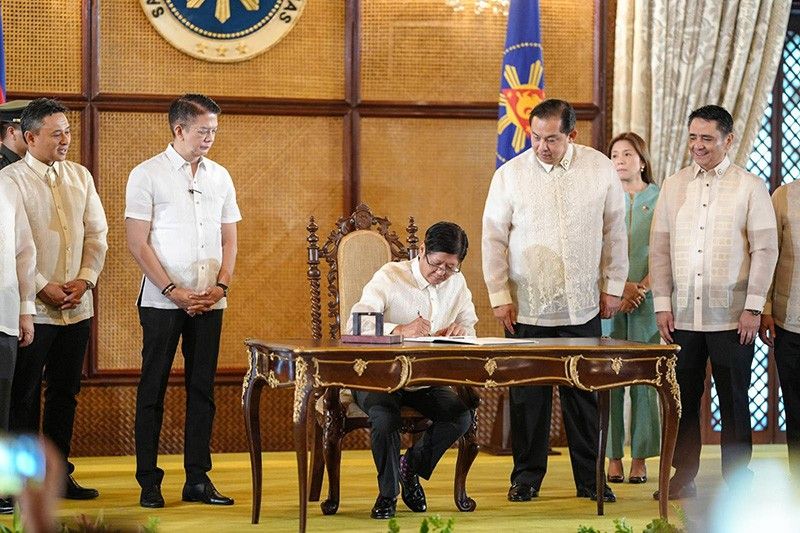Fighting corruption with the new procurement law

Time after time, the Philippines has been haunted by billions-worth of procurement scandals---from the botched NBN-ZTE deal in the 2000s, to the multi-billion pork barrel scam in the 2010s, to the Pharmally scandal during the COVID-19 pandemic in the 2020s.
Corruption remains to be one of the biggest problems in the country. The 2023 Corruption Perception Index shows Philippines at the lower end of the spectrum among Asia-Pacific countries, while the June 2024 Pulse Asia survey shows that fighting graft and corruption is the fifth most urgent national concern for Filipinos.
Given this context and with the Marcos Jr. government’s proposed national budget of P6.35 trillion next year, the recent passage of the New Government Procurement Act, dubbed as the “biggest anti-graft and corruption law” in our modern history, is significantly timely.
Republic Act 12009 or the New Government Procurement Act (NGPA) hopes to significantly improve the execution of government projects through key reforms. One of these is the creation of a new award criterion, the Most Economically Advantageous Responsive Bid (MEARB), in the procurement process, in addition to the existing Lowest Calculated Responsive Bid (LCRB).
The MEARB frees implementing agencies from the requirement of only selecting the lowest-priced bid and gives procuring entities the chance to also prioritize the qualitative and economic values of the project and bids.
The NGPA also mandates that all procurement should be conducted with sufficient planning and preparation to ensure sound procurement decisions. Studies show that 50% of the causes of delays and failures of procurement are due to poor cost estimates, problems on technical specifications or terms of reference, and end-user’s late submission of Purchase Request.
Conducting strategic procurement planning ensures the efficient and effective management of government spending, and, as a result, on-time delivery of government services to the Filipino people.
But the most important key reform in the NGPA, I believe, is enhancing transparency and accountability in the procurement process.
The new measure aims to do this through open government and participatory procurement, modernizing procurement processes with the use of emerging technologies and innovative solutions or digitalization, strengthening procurement planning, and even professionalizing procurement practitioners.
These key features aim to address issues such as corruption, under-the-table agreements, uncompetitive behavior, and other criminal activities.
In procurement, the government buys goods and services using public funds for the benefit of the Filipino people. If these reforms are implemented properly and effectively, the government can potentially save billions of pesos and produce quality and efficient public goods and services that can be enjoyed by millions of Filipinos.
At a time when the soaring prices of goods and services and the low pay of workers remain to be the top concerns of Filipinos, transparent, accountable, and responsive government services will definitely help alleviate the lives of many of our kababayans.
One of the most promising provisions in the NGPA is the enhancement of transparency and ensuring greater accountability through open government and digitalization.
In her statement, Budget Secretary Amenah Pangandaman said the NGPA aims to energize public participation in the procurement process by improving the public’s access and monitoring of the procurement process through observer participation and the use of video recording for all procurement-related conferences.
This means, in just a few clicks, the public can have access to important, comprehensive, and timely information about government procurement and the implementation of programs and projects.
Corruption thrives in confidentiality. When processes are hidden under the cloak of secrecy, all rules may be off-the-table. Modernizing the procurement process will not only ensure transparency and efficiency, but it will also empower citizens to hold erring government officials accountable for their actions.
With the 2025 elections less than a year away, giving Filipinos access to relevant government information such as how public funds are spent by their elected officials will equip them with the right information to make the right decisions come election day. Hence, also strengthening democracy in the country.
Moreover, the NGPA also aims to institutionalize professionalization among procurement officials and build a cadre of professionals who will not just embody technical competence but also espouse ethical practices.
This will be done by clearly defining public procurement positions, institutionalizing qualification standards for these positions, requiring certification courses, employing competency framework, implementing strict code of ethics, and licensing of public procurement practitioners.
Machiavelli once said that corruption is a decline of civic virtue at the hands of self-interest and greed. Instilling integrity among government officials involved in the procurement of goods and services for the Filipino people and strengthening their moral foundation is an important step in ensuring accountable and responsive governance.
However, to ensure the success of this reform and to fully realize the importance and value of citizen participation, it is also important to address the need to capacitate ordinary Filipinos to help them better understand how the procurement process works, how to interpret contracts, and how to effectively monitor the implementation of these agreements.
It is not enough that the procurement process is made available to the public, there is a need to equip the people with ample knowledge and skills that will enable them have a more active and meaningful participation in the procurement process. Hence, in developing the Implementing Rules and Regulations, it is necessary to include capacity building programs for civil society organizations and interested citizens that will help them understand the procurement process.
When government officials engage in corrupt activities, they are stealing the hard-earned money of ordinary Filipinos, who toil day and night to provide for their families. Instead of providing quality health care to the sick, livelihood to those in need, or education to disenfranchised children, public funds go to the pockets of the powerful and abusive officials. It’s about time we put a stop to this.
If used honestly and efficiently, the national budget has the power to improve the lives of ordinary people and pump prime the country’s economy. The NGPA is a step in the right direction. And I look forward to the effective implementation of this promising measure.
Joyce Ilas-Reyes is the deputy executive director for strategic engagements of think tank Stratbase ADR Institute. She is also a co-convenor of Democracy Watch Philippines.
- Latest


























